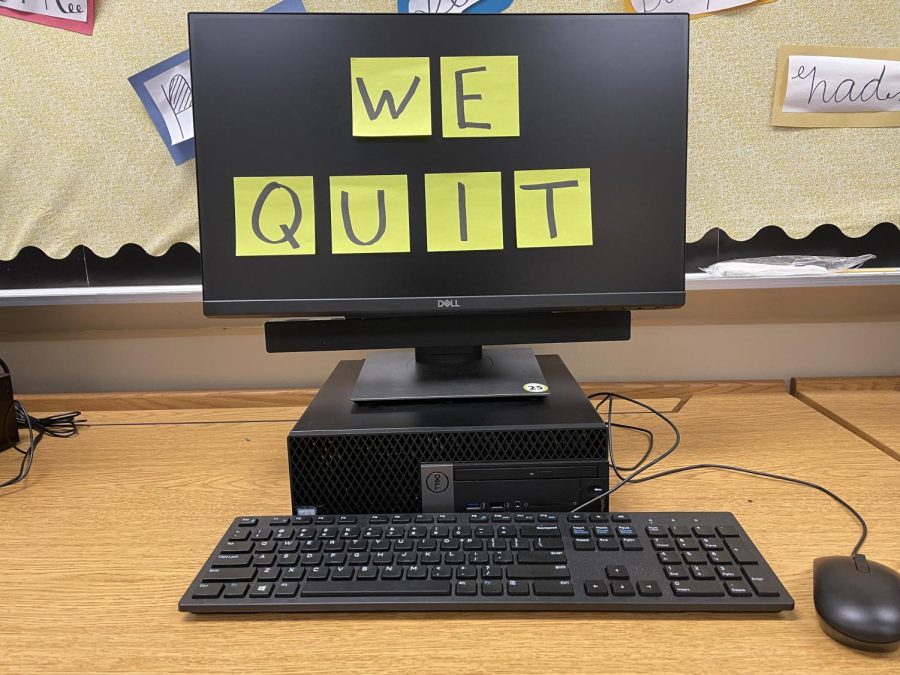The Great Resignation
At the tail end of the pandemic, workers feel fed up with pay and working conditions. This led to the Great Resignation across various careers and jobs. Restaurants, for example, have gone understaffed and frequently close because of an influx of customers with no staff to serve them. This not only affects small businesses but large corporations as well.
October 28, 2021
As of September 2021, over 4 million Americans quit their jobs. The mass departures led to a movement called ‘The great resignation’. Factory workers, fast food employees, healthcare providers and even school teachers have quit their jobs and added to the massive statistic of unemployed Americans. Minimum wage, under-compensation, mistreatment and vaccine mandates all aided in this movement.
With over half a million people dead from the virus, hospitals overflowed with patients. At certain periods throughout 2020 and 2021, hospitals nationwide ran out of rooms and beds. In an instance of panic, Emory Hospital in Atlanta, Georgia announced directions on how to handle a stroke, heart attack or seizure. They did this in an effort to relieve Emergency Room employees and slow down the number of patient admissions. As a result of a large number of patients, the nurse-to-patient ratio did not favor the healthcare providers. Undercompensation plagues the healthcare field. Becker Hospital Review reports that 18% of healthcare workers have quit their jobs for various reasons. The call for change among healthcare workers influenced teachers and began a new wave of resignations.
“People do not get paid enough to deal with the disrespect they receive. Then there are also people who are quitting simply to collect a check. Even before COVID, fast food workers did not deserve the disrespect and deserved higher wages. Teachers are underpaid as well. They are in charge of raising the next generation of the working class. People place a stigma on fast-food workers but are the same ones waiting in the drive-thru line. These people are doing a service, but they do not have to do it,” Senior Erica Holder said.
From in-person learning to an online alternative, teachers at every level faced a new academic challenge. The pandemic forced teachers to devise new lesson plans and adjust their teaching styles. Teachers, especially of younger students, serve as an added parental unit. Through the transition from in-person to online school, teachers found difficulty in offering a safe space along with providing interaction and support students can only receive from a teacher.
Now that students around the country have returned to school, teachers face a new set of challenges. According to several teachers at NC, a large number of students need to repeat courses or simply do not care to continue with school. Teachers must now play the roles of teacher, friend, parental figure, counselor and comforter to at least 20 students. The overwhelming stress and added responsibility have led to the resignation of 1 in 4 public school teachers.
“It has not crossed my mind thus far. I am so close to retirement that I won’t drop the ball now. Some younger teachers may think differently and want to find something else to do career-wise. Transitioning from in-person to online was difficult for us. It felt like we [teachers] were working so much, but students were not able to provide the same effort,” AP literature teacher Kathy Ezzell said.
The great resignation led to mass migration from working in person to working from home. The pandemic, along with other factors, prevented people from going to work in person while working remotely provided plenty of Americans with the convenience to stay home, take care of their children and create their own work environment. This will continue to reshape the workforce in several aspects. Employees at different companies must no longer deal with irritating commutes, pesky co-workers, odd break room smells, and the micromanaging superior at every corner.
Throughout the course of 2021, news outlets referred to this movement as a “labor shortage”. Those who left their jobs argued that they made more money from a monthly unemployment check than they did at work. In Georgia, a citizen on unemployment can make as low as $55 and a maximum of $365 weekly. The Biden Administration administered $1,400 stimulus checks to those eligible. The U.S. government made a total of three stimulus payments to eligible recipients. For the first time in April 2020, again in January of 2021, and for a third time in March of 2021. Those three deposits compile more money than someone making minimum wage would earn in one year of working.
“I think we’re severely underpaid. A lot of us don’t even make $9 and we’re expected to take all of the disrespect from our customers. A lot of times we’re disrespected for things that aren’t necessarily our fault. No one can make a living working in fast food,” senior and Arby’s employee Solange Griffith said.
As factory workers go on strike and demand fair treatment, the great resignation will continue. The workforce Americans once knew will never return. Working remotely and demanding better conditions and pay will continue to plague society until a notable change is made. The great resignation does not serve as a temporary fix, but rather a loud movement that demands attention.







